Garden Maintenance in Catford: Ensuring a Beautiful and Healthy Garden Year-Round
Introduction to Garden Maintenance
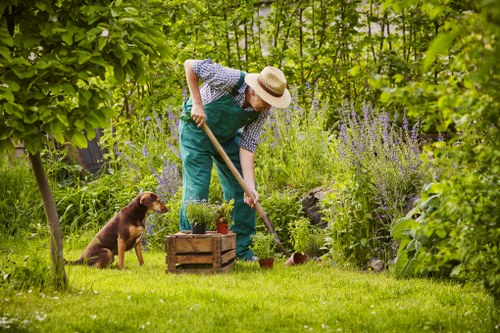
Maintaining a garden in Catford requires dedication, knowledge, and the right tools. Whether you're a seasoned gardener or a beginner, understanding the essential aspects of garden maintenance can transform your outdoor space into a vibrant and inviting haven.
Garden maintenance involves a variety of tasks, from regular watering and pruning to more complex activities like soil testing and pest control. Each task plays a crucial role in ensuring the health and beauty of your plants.
By investing time and effort into proper garden maintenance, you can enjoy a lush, thriving garden that enhances your property's aesthetic appeal and provides a peaceful retreat from the hustle and bustle of daily life.
Seasonal Garden Maintenance in Catford
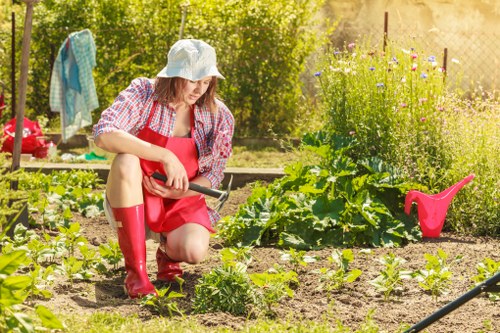
Garden maintenance in Catford varies with the changing seasons. Each season presents unique challenges and opportunities for gardeners to nurture their plants and prepare for the next cycle.
Spring: This is the time to prepare your garden for the growing season. Start by cleaning up any winter debris, pruning dead branches, and planting new flowers and vegetables. Regular watering and fertilizing are essential to support new growth.
Summer: During the warmer months, focus on watering, weeding, and pest control. Ensure your plants receive adequate sunlight and consider using mulch to retain moisture and suppress weeds.
Essential Tools for Garden Maintenance
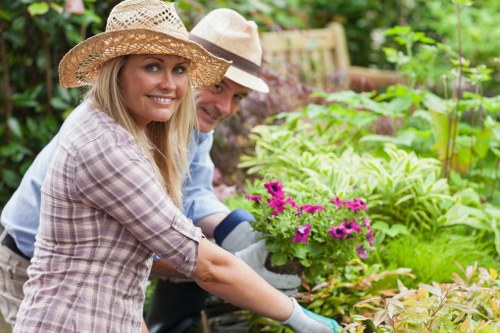
Having the right tools is essential for efficient and effective garden maintenance. Investing in quality tools can make a significant difference in the ease and outcome of your gardening tasks.
Some must-have tools include:
- Pruning shears for trimming and shaping plants.
- A sturdy garden hose with adjustable nozzles for watering.
- Hoes and spades for weeding and soil preparation.
- Rakes for gathering leaves and debris.
- Gardening gloves to protect your hands.
Using these tools correctly can help maintain the health of your garden and make the maintenance process more enjoyable.
Soil Health and Fertilization
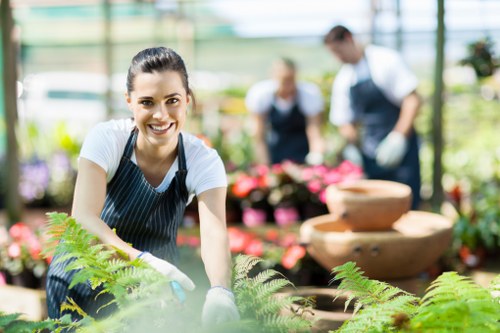
Healthy soil is the foundation of a thriving garden. Proper soil maintenance ensures that your plants receive the necessary nutrients and have a conducive environment for growth.
Regularly testing your soil can help you understand its composition and identify any deficiencies. Based on the results, you can amend the soil with organic matter, compost, or fertilizers to enhance its fertility.
Proper fertilization schedules are crucial. Over-fertilizing can harm plants, while under-fertilizing may stunt growth. It's important to follow recommended guidelines for each type of plant in your garden.
Pest and Disease Management
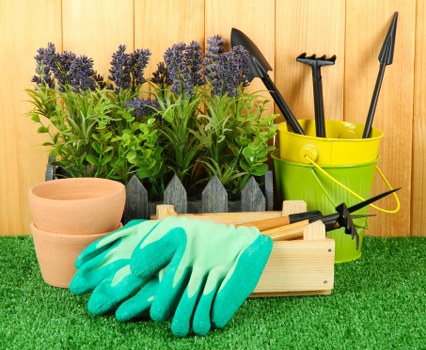
Managing pests and diseases is a critical aspect of garden maintenance. In Catford, gardeners must be vigilant in identifying and addressing issues promptly to prevent widespread damage.
Implement integrated pest management (IPM) practices, which combine biological, cultural, and chemical methods to control pests. Encouraging beneficial insects, using natural pesticides, and maintaining plant health can reduce the incidence of pests and diseases.
Regular inspections of your plants can help catch problems early. Remove affected parts, treat with appropriate solutions, and consider consulting a garden professional if issues persist.
Lawn Care
A well-maintained lawn enhances the overall look of your garden and provides a pleasant space for outdoor activities.
Key lawn care practices include:
- Mowing: Regular mowing keeps the grass healthy and encourages thick growth. Ensure you mow at the correct height for your grass type.
- Watering: Deep and infrequent watering is more beneficial than frequent shallow watering. This promotes deep root growth.
- Fertilizing: Apply lawn fertilizers as per the schedule to provide essential nutrients.
- Aerating: Aeration helps alleviate soil compaction and improves water and nutrient absorption.
Maintaining a healthy lawn not only boosts your garden's appearance but also supports overall plant health.
Pruning and Trimming
Regular pruning and trimming are vital for the health and aesthetics of your garden. These practices help shape plants, remove dead or diseased branches, and promote better air circulation.
When pruning, use sharp and clean tools to make precise cuts. Understand the specific pruning needs of each plant, as different species require different techniques and timing.
Proper pruning can enhance plant growth, increase fruit or flower production, and prevent potential hazards from overgrown branches.
Garden Design and Layout
An effective garden layout not only maximizes space but also ensures that each plant receives the appropriate amount of sunlight and nutrients.
Consider the following when designing your garden:
- Plant placement based on sunlight requirements.
- Grouping plants with similar water and soil needs.
- Incorporating pathways and borders for easy maintenance.
- Using vertical gardening techniques to save space.
A well-thought-out design simplifies maintenance tasks and creates a visually appealing outdoor space.
Watering Techniques and Irrigation
Efficient watering is crucial for garden maintenance. Proper irrigation ensures that plants receive the right amount of water without wastage.
Consider the following watering techniques:
- Drip Irrigation: Delivers water directly to the plant roots, reducing evaporation and runoff.
- Sprinkler Systems: Suitable for larger areas but may lead to water waste if not properly managed.
- Rainwater Harvesting: Collects and stores rainwater for garden use, promoting sustainability.
Adjust your watering schedule based on weather conditions and seasonal changes to maintain optimal soil moisture levels.
Mulching Benefits
Mulching offers numerous benefits for garden maintenance. It helps retain soil moisture, suppress weeds, and regulate soil temperature.
Choose the right type of mulch based on your garden's needs. Organic mulches, such as bark, straw, or compost, enrich the soil as they decompose. Inorganic mulches, like gravel or rubber, provide longer-lasting weed control but do not improve soil fertility.
Apply mulch uniformly around your plants, ensuring it doesn't touch the stems to prevent rot and pests.
Composting for a Healthy Garden
Composting is a sustainable practice that recycles organic waste into nutrient-rich fertilizer for your garden.
By composting kitchen scraps, yard waste, and other organic materials, you can improve soil structure, enhance microbial activity, and reduce the need for chemical fertilizers.
Maintain your compost pile by balancing green and brown materials, ensuring proper aeration, and keeping it moist. Regular turning helps speed up the decomposition process.
Dealing with Common Garden Pests
Various pests can threaten your garden's health. Common garden pests in Catford include aphids, slugs, snails, and caterpillars.
Implement natural pest control methods by introducing beneficial insects like ladybugs and lacewings, which prey on harmful pests. Additionally, use barriers and traps to manage slug and snail populations.
For severe infestations, consider eco-friendly pesticides that minimize harm to beneficial organisms and the environment.
Ensuring Proper Drainage
Proper drainage is essential to prevent waterlogging, which can lead to root rot and other plant diseases.
Evaluate your garden's drainage by observing water flow after heavy rains. Improve drainage by adding organic matter to the soil, installing drainage systems, or creating raised beds.
Ensure that water from irrigation systems or rainwater harvesting setups is directed away from plant roots to maintain optimal soil conditions.
Incorporating Native Plants
Native plants are well-adapted to the local climate and soil conditions in Catford, making them an excellent choice for low-maintenance gardens.
They require less water, are more resistant to local pests and diseases, and support local wildlife, including pollinators and beneficial insects.
Incorporating native plants can reduce the need for extensive maintenance and contribute to the overall health of your garden ecosystem.
Regular Inspections and Monitoring
Frequent inspections of your garden help you stay ahead of potential issues. Regularly check plants for signs of stress, pests, or diseases.
Monitoring enables early detection and swift action, preventing minor problems from escalating into major ones.
Keep a gardening journal to track the health and growth patterns of your plants, which can guide future maintenance efforts.
Practical Gardening Tips
Implementing practical gardening tips can enhance your garden maintenance routine:
- Start with a well-planned garden layout to streamline maintenance tasks.
- Use raised beds to improve soil quality and drainage.
- Rotate crops annually to prevent soil depletion and reduce pest buildup.
- Integrate companion planting to naturally deter pests and promote plant health.
- Regularly update your knowledge on gardening best practices and local plant varieties.
These tips can make garden maintenance more manageable and increase the success of your gardening endeavors.
Hiring Professional Garden Maintenance Services
While DIY garden maintenance is rewarding, sometimes hiring professional services can be beneficial, especially for complex tasks or large gardens.
Professional garden maintenance services in Catford offer expertise, saving you time and ensuring high-quality care for your garden.
Services may include regular maintenance visits, landscaping, pest control, and specialized plant care, tailored to your garden's specific needs.
Book your service now to experience the benefits of a professionally maintained garden.
Eco-Friendly Gardening Practices
Adopting eco-friendly gardening practices contributes to environmental sustainability and creates a healthier garden ecosystem.
Some sustainable practices include:
- Using organic fertilizers and pest control methods.
- Implementing water-saving irrigation techniques.
- Promoting biodiversity by planting a variety of species.
- Recycling garden waste through composting.
- Choosing native and drought-resistant plants.
By integrating these practices into your garden maintenance routine, you support a greener and more resilient garden.
Maintaining Garden Tools
Proper maintenance of your garden tools ensures their longevity and effectiveness.
Regularly clean your tools after use to prevent rust and buildup of soil or plant residues. Sharpen blades and replace worn parts as needed.
Store tools in a dry, sheltered area to protect them from the elements and prolong their lifespan.
Well-maintained tools make garden maintenance tasks easier and more efficient.
Contact us today to learn more about maintaining your garden tools.
Creating a Sustainable Garden
A sustainable garden minimizes environmental impact while maximizing resource efficiency and ecological balance.
Incorporate practices such as rainwater harvesting, composting, and using renewable materials in garden structures. Choose plants that require minimal watering and are resistant to local pests.
Promoting sustainability in your garden not only benefits the environment but also reduces maintenance efforts and costs in the long run.
Enhancing Garden Aesthetics
Beyond health and functionality, maintaining a visually appealing garden enhances your outdoor living experience.
Incorporate elements like flower beds, decorative pathways, and garden lighting to create an inviting atmosphere. Use color schemes and plant arrangements that reflect your personal style and complement your home's architecture.
Regular maintenance ensures that these aesthetic features remain well-kept and contribute positively to your garden's overall appearance.
Winter Garden Maintenance
Winter presents unique challenges for garden maintenance in Catford. Proper preparation can protect your garden from harsh weather conditions and set the stage for a healthy spring.
Tasks include clearing fallen leaves, protecting sensitive plants with mulch or coverings, and pruning trees and shrubs before they enter dormancy.
Ensuring that your garden survives the winter months paves the way for robust growth and blooming when the warmer seasons return.
Maintaining Garden Paths and Structures
Garden paths, fences, pergolas, and other structures require regular maintenance to stay functional and attractive.
Inspect these elements for signs of wear, damage, or decay. Repair or replace components as necessary to ensure safety and aesthetic appeal.
Cleaning and sealing wooden structures can extend their lifespan and maintain their appearance.
Book your service now to keep your garden structures in top condition.
Using Technology in Garden Maintenance
Modern technology can significantly enhance garden maintenance practices. Utilize tools like weather apps to monitor conditions, smart irrigation systems for efficient watering, and garden management software to plan and track maintenance tasks.
Embracing technology helps optimize resources, reduce manual labor, and improve overall garden health.
Stay updated with the latest gardening technologies to make your maintenance routine more effective and enjoyable.
Community Gardening in Catford
Engaging in community gardening fosters a sense of belonging and shared responsibility for maintaining green spaces in Catford.
Community gardens provide opportunities for knowledge exchange, resource sharing, and collaborative maintenance efforts, making garden upkeep more manageable and enjoyable.
Participating in or supporting community gardening initiatives contributes to a greener and more connected community.
Contact us today to join local community gardening projects.
Water Management Strategies
Effective water management is essential for sustainable garden maintenance. Implement strategies to conserve water and ensure that your garden receives adequate moisture.
Techniques include installing rain barrels, using greywater systems, and selecting drought-tolerant plant species. Additionally, mulching and proper soil management help retain soil moisture.
Adopting these strategies reduces water consumption and promotes a healthier garden environment.
Integrating Wildlife into Your Garden
Encouraging wildlife in your garden enhances biodiversity and creates a balanced ecosystem. Birds, bees, butterflies, and beneficial insects play vital roles in pollination and pest control.
Provide habitats for wildlife by installing birdhouses, bee hotels, and creating water sources. Plant a variety of flowering plants to attract and support diverse species.
Integrating wildlife not only benefits your garden's health but also contributes to the natural beauty and serenity of your outdoor space.
Maintaining Privacy and Security
Privacy and security are important aspects of garden design and maintenance. Use hedges, fences, and strategically placed plants to create secluded areas and deter unwanted visitors.
Regularly trim hedges and maintain barriers to ensure they remain effective. Incorporate lighting and surveillance systems as needed for enhanced security.
A well-maintained garden can provide both privacy and safety, allowing you to enjoy your outdoor space without concerns.
Common Mistakes in Garden Maintenance
Avoiding common garden maintenance mistakes can save time, resources, and plant health. Some frequent errors include:
- Overwatering or underwatering plants.
- Neglecting soil health and ignoring the need for fertilization.
- Improper pruning techniques that damage plants.
- Ignoring pest and disease signs until they become severe.
- Choosing the wrong plants for your garden's conditions.
Being aware of these mistakes and taking proactive measures can lead to more successful and enjoyable garden maintenance.
Contact us today for professional advice and assistance in avoiding these common pitfalls.
Final Thoughts on Garden Maintenance
Effective garden maintenance in Catford is a blend of knowledge, consistent effort, and the right resources. By understanding the seasonal needs, investing in quality tools, and adopting sustainable practices, you can cultivate a beautiful and healthy garden.
Whether you choose to maintain your garden yourself or enlist professional services, the key is to stay informed and proactive in your approach.
Enjoy the rewards of a well-maintained garden, from stunning blooms and lush greenery to a serene outdoor sanctuary.
Book your service now and take the first step towards a thriving garden.